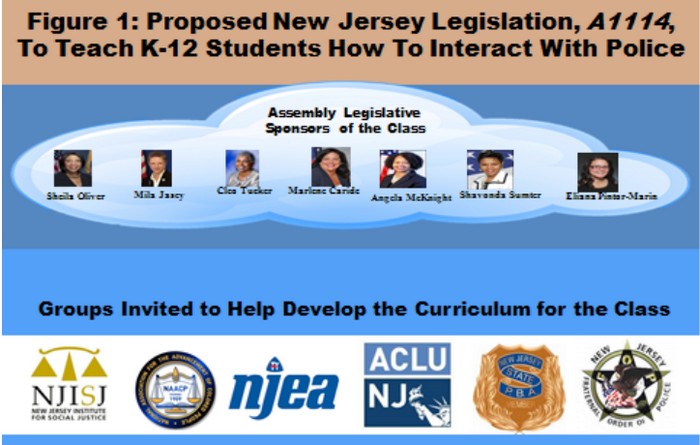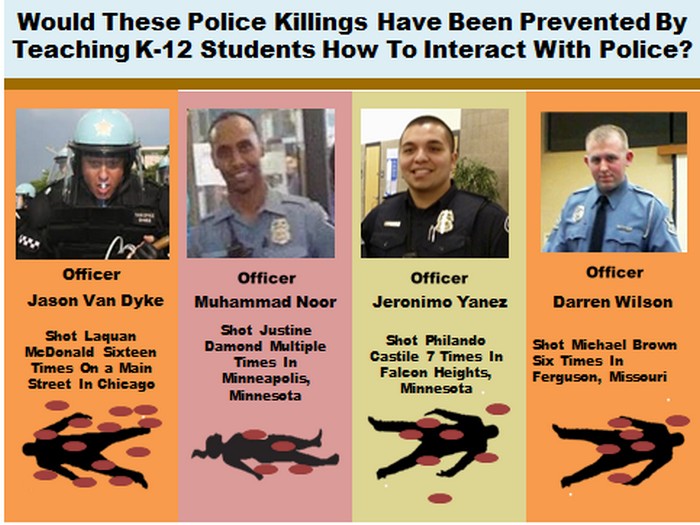|
In
recent months New York City, Texas, New Jersey, and other states have
conceived and/or are developing classes to teach students how to
interact with police as a way to reduce the hundreds of questionable
police shootings across the nation. Courses have been established
for all public school students and for those enrolling in driver’s
education lessons. As noted in an earlier column, New Jersey is the
latest to join this effort. What is most unique in this instance is
that legislation to implement this initiative has been spearheaded by
seven African American and Hispanic Assemblywomen: Sheila Oliver,
Mila Jasey, Cleo Tucker, Marlene Caride, Angela McKnight, Shavonda
Sumter, and Eliana Pintor-Marin (See Figure 1).
They
believe that it will replicate “the
talk”
that many parents of color have traditionally had with their children
about how to stay alive when they encounter police officers, many of
whom have negative, stereotypical view of minority citizens.
Unfortunately, the Assemblywomen fail to understand that “the
talk” is “…
a
plea from a systematically battered people to their children, begging
them to acquiesce to the relinquishing of their rights just so they
can make it home alive” since
policing overall is rife with officers who have bigoted and racist
views toward people of color.
With
the unanimous support of their white male and female counterparts in
the New Jersey Assembly, the bill, A114,
passed on a 76-0 vote. It now sits in the Education Committee in the
New Jersey Senate as the surrounding politics have caused a delay.
As word has spread about the potential passage of this legislation,
growing numbers in the state’s minority communities are
opposing this measure. They recognize that many of the destructive
police-community interactions they have witnessed in their
communities and/or have personally experienced in their daily lives
will not be improved by having the police participate in the creation
of a class in which they will have significant input. Of the six
community organizations invited to contribute to the curriculum,
one-third represent police officers, and they have been resolute in
defending existing police behavior irrespective of the police and
citizen cell phone videos documenting highly questionable police
practices (see Figure 1).

The
National ACLU is monitoring this proposed instruction across the
nation, and it is uncertain that all these organizations will sign on
as the issue becomes more controversial. Moreover, it is ironic that
the Texas sponsor of this victim blaming legislation, (House Bill
1864), State Rep. Sefronia Thompson, is also an African American
female, and her Senate co-sponsor Royce West, with Senate Bill 30, is
a black male. These well-meaning, but misguided legislators,
perhaps, pursued this strategy out of well-meaning desperation to
stop the killings of males and females of color in their communities.
But they are na�ve if they believe this is a solution to this
crisis. Even Sen. West acknowledged after passage of the legislation
that … “he
wasn't sure if these bills would've saved (Jordan) Edwards's life (a
15 year-old unarmed teen killed by police in a Dallas suburb),”
stating,
"I
don't know how [my bill] would have impacted that situation."
Therefore
it appears that our policymakers are just throwing stuff up against
the wall in their political and personal desires to address an
escalating public disaster.

Currently,
New Jersey’s A114
statute is on hold as both houses of the legislature prepare for the
November 2017 elections when all Assembly and Senate
members, along with the governor, will be on the ballot. In
addition, the Democrats are trying to take back the governorship that
Chris Christie wrested from them in 2009. Thus they do not want any
unforced political errors. In addition, the Democratic gubernatorial
candidate, Phil Murphy, has selected the primary sponsor of the
police interaction bill A114
to run on his ticket as Lieutenant Governor, with the expectation
that she will ensure his victory (he already has a 24 point lead over
his Republican adversary Lt. Gov. Kim Guadagno). In New Jersey
statewide elections, Democrats cannot win unless they carry an
overwhelming share of the black vote with a strong turnout.
A
Democratic incumbent, Gov. Jim Florio, was unsuccessful in his
re-election bid in 1993 when he alienated a noteworthy number of the
African American clergy. Florio’s Republican rival, Christie
Whitman, made major last minute inroads into that group with the
assistance of one of its key leaders. Consequently, although Murphy
is presently far ahead, one might reflect on the musings of that
great New Jersey philosopher, Yogi Berra, … “it
ain’t over til it is over.”
As
shown in Figure 2 below, it is highly unlikely that the 2014
slaughter of the following individuals would have been prevented by
having students or the broader community take classes on interacting
with police: the killing of Laquan McDonald by Officer Jason Van
Dyke, who shot him 16 times on a Chicago street for allegedly
approaching him with a knife which dash cam footage proved to be a
lie; Officer Jeronimo Yanez’s shooting into Philando Castile’s
car 7 times as he was complying with all of Yanez’s directives;
Officer Darren Wilson’s shooting of Michael Brown 6 times for
walking in a Ferguson street, an incident that launched a national
movement against police violence; and Officer Muhammad Noor’s
shooting of Justine Damond, a bride-to-be, multiple times as she was
seeking police assistance for what she believed to be a rape, because
he heard a noise that no nearby witnesses confirmed. The slaying of
Damond, a white woman, generated a national, cross-racial outpouring
of anger and grief over this apparently senseless homicide. It
caused the Mayor of Minneapolis to immediately call for the
resignation of the police chief in response.

With
the petitions and protests against A1114
on the rise, it is highly unlikely that it will pass the New Jersey
Senate before the 2017 elections, although Gov. Christie would be
excited to sign it as it would give a boost to his post-gubernatorial
career. Passage of A1114,
at this time,
could undo the Democratic coalition that is needed for individual and
collective electoral successes.
Phil Murphy has a decision to make, whether he will run on a ticket
that could alienate a critical part of his African American base by
supporting a bill they increasingly find offensive, giving his
Republican competitor an opening to pull votes from and/or lower
turnout in his base.
Time
is near for a decision. The
Farrell Report
will be on hiatus during the month of August, conducting polls and
focus groups on the aforementioned matter in New Jersey’s
African American communities. Results will be released in the
September column.
|

